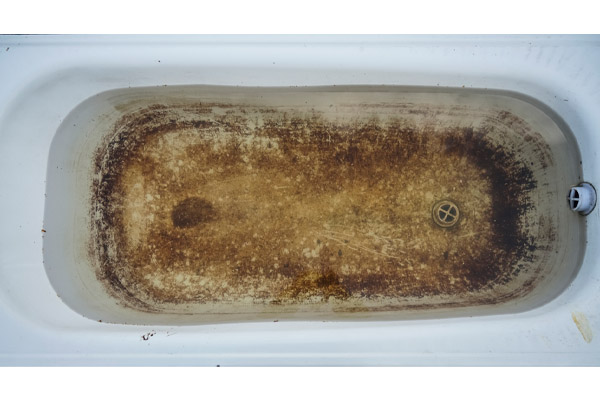Scrutinizing the Phenomenon of Effluent Rising Through the Bathtub
Scrutinizing the Phenomenon of Effluent Rising Through the Bathtub
Blog Article
What're your beliefs about What To Do If Sewage Starts Backing Up Into the Shower?

Sewer back-up in the bathtub can be a distressing and unsanitary problem for any kind of home owner. Not just is it troublesome, however it additionally presents serious health and wellness dangers and indicates underlying problems with the plumbing system. Recognizing why sewer is showing up with the tub is crucial for taking suitable activity to attend to the issue effectively.
Intro to the Issue
Understanding the Trouble
When sewer starts backing up right into the bathtub, it's a clear sign of an issue with the drainage system. The wastewater that needs to be streaming far from your home is instead finding its way back right into your space, which can cause substantial damages and carcinogen.
Prospective Reasons
Several elements can add to sewer backup in the bath tub. From clogs in the sewer line to issues with the plumbing framework, recognizing the root cause is vital for discovering a remedy.
Common Reasons for Sewer Backup
Blockages in the Sewage System Line
One of one of the most usual reasons for sewer backup is an obstruction in the drain line. This can happen as a result of the accumulation of particles, grease, or international items in the pipes, protecting against appropriate circulation and triggering sewer to back up right into your bathtub.
Tree Origin Breach
Tree roots seeking dampness and nutrients can infiltrate drain lines via little cracks or joints. In time, these origins can grow and expand, causing substantial damage to the pipelines and resulting in sewer backup concerns.
Aging Facilities
Older homes may have obsoleted plumbing systems that are much more prone to rust, fractures, and wear and tear. As pipelines age, they become more prone to leaks and blockages, increasing the possibility of sewage backup cases.
Heavy Rainfall or Flooding
Throughout durations of heavy rainfall or flooding, the sewer system may become overloaded with excess water, triggering backups and overflows. This can result in sewage supporting right into bath tubs and other fixtures inside the home.
Wellness Dangers Associated with Sewage Back-up
Contamination of Water
Sewage back-up can contaminate the water system in your home, presenting a significant health threat to you and your family members. Direct exposure to contaminated water can lead to intestinal concerns, skin infections, and other illnesses.
Spread of Condition
Sewer contains damaging microorganisms, infections, and bloodsuckers that can trigger a range of conditions, consisting of liver disease, cholera, and gastroenteritis. Entering into contact with sewage or polluted surface areas puts you in jeopardy of infection.
Mold Development
Dampness from sewage backup can produce optimal problems for mold and mildew growth in your home. Mold and mildew spores can exacerbate breathing troubles and cause allergic reactions in delicate people, making timely clean-up important.
Indications of Sewer Back-up
Foul Odors
Unpleasant smells originating from drains or fixtures, specifically in the washroom, might suggest sewer back-up problems. These smells are usually strong and consistent, signifying a problem that needs instant focus.
Slow Draining Fixtures
Bath tubs, sinks, and commodes that drain slowly or otherwise in any way could be experiencing sewage backup. If numerous fixtures are affected simultaneously, it's most likely that the concern originates from an usual factor, such as the main sewer line.
Gurgling Noises
Unusual gurgling or bubbling noises originating from drains pipes when water is running in other places in your home are indicative of air caught in the plumbing system. This air accumulation can arise from sewage backup and need to be explored without delay.
Immediate Actions to Take
Switching Off Water Supply
In case of sewer back-up, it's vital to shut off the water system to avoid more contamination and damage. Find the major water shutoff valve in your house and shut it off until the concern can be settled.
Calling a Professional Plumber
Handling sewer backup is not a DIY job. Call an accredited plumber with experience in handling sewage-related problems to assess the circumstance and perform required fixings or cleanups.
Preventing Contact with Infected Water
Until the sewage back-up is resolved, avoid contact with infected water to stop the spread of microorganisms and pathogens. Use safety gear if you have to remain in the damaged area and clean your hands thoroughly afterward.
Preventive Measures
Regular Upkeep of Sewage System Lines
Schedule routine inspections and upkeep of your sewer lines to identify and address potential issues prior to they rise into major issues. This can consist of cleaning out particles, evaluating for tree root intrusion, and repairing any type of damaged pipes.
Mounting Bayou Valves
Take into consideration setting up backwater valves in your plumbing system to stop sewer from receding right into your home during durations of heavy rainfall or flooding. These valves instantly close when water starts backing up, protecting your residential property from contamination.
Proper Disposal of Household Waste
Stay clear of flushing anything apart from toilet tissue and human waste down the bathroom to prevent obstructions and blockages in the drain line. Dispose of grease, oil, and various other family chemicals effectively to reduce the danger of plumbing problems.
Tidying up After Sewer Backup
Sanitation Procedures
Completely disinfect and sanitize affected areas after sewer backup to remove harmful microorganisms and stop mold growth. Use proper cleansing items and protective equipment to make sure risk-free and effective cleanup.
Remediation of Impacted Locations
Fix any damage to flooring, walls, or fixtures brought on by sewage backup. Depending upon the degree of the damages, you may need to change carpeting, drywall, or other products to restore your home to its pre-loss condition.
Why is there sewage coming up from my bathtub?
These gas fumes, like hydrogen sulfide – the gas that leaves a rotten egg smell in its wake and is highly flammable and toxic – can be hazardous to your health. Sewage poses major health risks as it contains harmful bacteria and microorganisms that can be dangerous if exposed to them.
Sewage cleanup should be considered an emergency.
So, why is there sewage coming up from your bathroom? There are several common causes of a sewage backup.
The most common reason for sewage coming up through your bathroom is a clogged sewer line. All plumbing in your bathroom connects to a single drain pipe that leads to the sewer line under your house. This drain line carries all wastewater and sewage away from your home to the city’s sewer system.
When the sewer line becomes clogged or blocked, wastewater has nowhere to go but back toward your house. This results in sewage coming up through your drains, often starting with your tub or shower.
Another culprit may be the sewage ejector pump, which is used when a bathroom, laundry room or any other type of plumbing fixture is located below the level of the main sewer or septic line flowing from the house. Most commonly, ejector pumps are used in homes with basement bathrooms or laundry rooms.
When you experience sewage coming up through your bathtub, it’s always best to contact a professional. Attempts to fix a clogged sewer line without experience often lead to more plumbing damage.
Make sure that no one enters the affected area, and open as many windows as possible. Pre-treat the flooded area with small splashes of chlorine bleach. Wear protection gear like rubber gloves, a mask, and water-resistant coveralls.
https://www.shawlocal.com/the-herald-news/sponsored/2022/08/17/omega-plumbing-10199038/

I discovered that blog entry on Why sewage is coming up through your bathtub when doing a lookup on the internet. Sharing is good. Helping people is fun. We take joy in your readership.
Click Here
Report this page